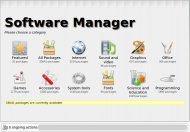@SB:
For raw beginners, start them off with the standard Gnome version of
LinuxMint. I'd recommend the latest release (
Release-11 "Katya"). Katya is one slick and very polished release that comes with a very familiar looking desktop. And a start menu that provides all the power of Gnome with only half the culture shock.
Good friendly community support too. Maybe not quite on par with the folks at DoCo - but that's what makes DoCo what it is so whaddya want?
Hint: The best way to introduce Linux it is to put a Windows user in front of it and simply say "Hey! Check this out. It works just like Windows!"
Then let them have at it...
Most people pick up on it fairly quickly.
Especially if you don't say it's Linux or make a big deal out of it. I've even been guilty of telling less knowledgeable users it's an advance copy of Microsoft's newest top-secret version of Windows that will be coming out sometime next year. (Whenever I presented it to them that way almost every one of them LOVED it.)
For apps, Mint has a pretty version of apt called the
Software Manager.
 Why 2012 may finally be The Year of the Linux Desktop (courtesy of Microsoft)
Why 2012 may finally be The Year of the Linux Desktop (courtesy of Microsoft)You can browse, search, read comments and recommendations, and add or remove applications with it. It's easy enough that a novice can use it. And everything in it has been tweaked and tuned for Mint in particular - so anything found there is as stable as it gets.
For readable and solid info on the various distributions, check out
Distrowatch.comDistrowatch is the granddaddy of sites tracking the current state of Linux distros. Also stays on top of the major packages so there's some info on apps - although it's more journeyman than novice level in that regard.
For the Linux version of Snapfiles.com I'd go to the
Gnomefiles.org website. If it's Gnome, it's probably there.
Some people might get a little put off by some of the obviously college-level engineering and mathematical apps you'll see there. If they bug you, just ignore them. That's what I do when I see something I don't understand that doesn't really interest me anyway.
Other good sites are:
LXerUbuntu Sharing (Mint is based on Ubuntu - so most of what you'll find there applies to Mint)
Ars Technica's
OpenEndedFor the more advanced Windows user that's looking for serious tutorials and hands-on guidance in Linux, it doesn't get much better than
HowtoForge. Probably more suited to pro and semi-pro Nixers, but there's also enough semi-beginner stuff that there's something for everyone.
 Why 2012 may finally be The Year of the Linux Desktop (courtesy of Microsoft)
Why 2012 may finally be The Year of the Linux Desktop (courtesy of Microsoft)There's
tons more. But that should be enough to get somebody started.


